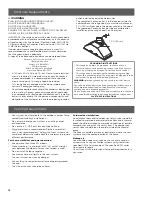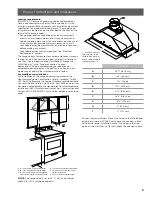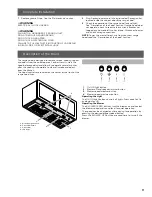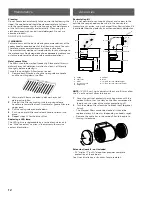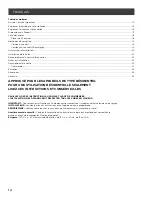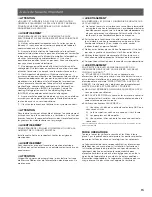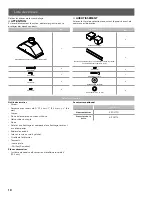
4
Electrical Requirements
I
WARNING
PLUG INTO A GROUNDED 3 PRONG OUTLET�
DO NOT REMOVE GROUND PRONG�
DO NOT USE AN ADAPTER�
DO NOT USE AN EXTENSION CORD�
FAILURE TO FOLLOW THESE INSTRUCTIONS CAN RESULT
IN DEATH, FIRE, OR ELECTRICAL SHOCK�
IMPORTANT: The range hood must be electrically grounded in
accordance with local codes and ordinances, or in the absence
of local codes, with the National Electrical Code, ANSI/NFPA
70 (latest edition) or Canadian Electrical Code, CSA C22�1 No�
0-M91 (latest edition)�
If codes permit and a separate ground wire is used, it is
recommended that a qualified electrical installer determine
that the ground path is adequate�
A copy of the above code standards can be obtained from:
National Fire Protection Association
1 Batterymarch Park
Quincy, MA 02169-7471
CSA International
8501 East Pleasant Valley Road
Cleveland, Ohio 44131-5575
• A 120 volt, 60 Hz, AC only, 15- or 20-amp, fused electrical
circuit is required� A time-delay fuse or circuit breaker is
also recommended� It is recommended that a separate
circuit serving only this range hood be provided�
• This range hood is equipped with a power supply cord
having a 3 prong grounding plug�
• To minimize possible shock hazard, the cord must be plugged
into a mating, 3 prong, grounding-type outlet, grounded
in accordance with local codes and ordinances� If a mating
outlet is not available, it is the personal responsibility and
obligation of the customer to have the properly grounded
outlet installed by a qualified electrician�
• The grounded 3 prong outlet is to be located inside the
cabinet above the range hood at a maximum distance of
35 7/16 (90 cm)
from where the power cord exits the hood�
The grounded 3 prong outlet must be accessible after
installation of the range hood� See illustration:
35 7/16 (90 cm)
GROUNDING INSTRUCTIONS
• This range hood must be grounded� In the event of an
electrical short circuit, grounding reduces the risk of electric
shock by providing an escape wire for the electric current�
• This range hood is equipped with a cord having a grounding
wire with a grounding plug� The plug must be plugged into an
outlet that is properly installed and grounded�
WARNING:
Improper grounding can result in a risk of electric
shock�
Consult a qualified electrician if the grounding instructions are
not completely understood, or if doubt exists as to whether
the range hood is properly grounded�
Do not use an extension cord� If the power supply cord is too short,
have a qualified electrician install an outlet near the range hood�
SAVE THESE INSTRUCTIONS
Venting Requirements
• Vent system must terminate to the outdoors, except for no
vented (recirculating) installations�
• Do not terminate the vent system in an attic or other
enclosed area�
• Do not use a 4” (10�2 cm) laundry-type wall cap�
• Rigid metal vent is recommended� Plastic or metal foil
vent is not recommended� The length of vent system and
number of elbows should be kept to a minimum to provide
efficient performance�
For the most efficient and quiet operation:
• Use no more than three 90° elbows�
• Make sure there is a minimum of 24” (61 cm) of straight
vent between the elbows if more than 1 elbow is used�
• Do not install 2 elbows together�
• Use clamps to seal all joints in the vent system�
• The vent system must have a damper�
• Use caulking to seal exterior wall or roof opening around
the cap�
• The size of the vent should be uniform�
Cold weather installations
An additional back draft damper non return valve should be
installed to minimize backward cold air flow and a thermal
break should be installed to minimize conduction of outside
temperatures as part of the vent system� The damper non
return valve should be on the cold air side of the thermal
break�
The break should be as close as possible to where the vent
system enters the heated portion of the house�
Makeup air
Local building codes may require the use of makeup air
systems when using ventilation systems with greater than
specified CFM of air movement� The specified CFM varies
from locale to locale�
Consult your HVAC professional for specific requirements in
your area�




